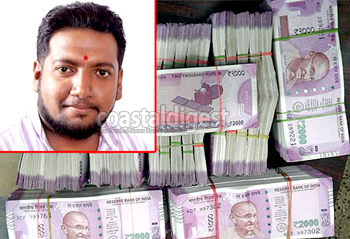Thrissur, Jun 23: The Kerala police have seized fake currency and printing machines from the house of a Yuva Morcha leader Sree Narayanapuram near Kodungallur. The police have arrested Erassery Rakesh, 31.
The BJP said that Rakesh was a regional committee member of the Yuva Morcha. The district president of the party says that Rakesh and his brother have both been expelled.
Police said they have seized fake currencies worth over Rs 1.31 lakh. The notes were of denominations of Rs 2,000 (65 notes) , Rs 500 (eight), Rs 50 (five) and Rs 20 (10), Chalakkudy DSP Shahul Hameed said.
The state Intelligence Bureau kept a watch on both of them after it realised that the brothers had become rich overnight. Investigations also found that the brothers had indulged in illegal money lending operations. The brothers scanned valid currencies using computers and later took print-outs in bond papers, the police said. Investigations found that the fake currencies looked genuine and it was difficult to identify them if transactions were done in a bunch. The fake notes were used for transactions at petrol pumps and at bars as well as for buying lotteries.






Comments
"Make in India" program.
Now all people know fake currency is from ,,,,,,,,,,
Police soon will catch several others
Modi's "Make or Made in India" - It may be thousands in the places of Goondaism Govt. states like Maharastra, UP... etc...
Add new comment